Classic Movie Review: 'The Lost Weekend' and Addiction
The Lost Weekend co-written and directed by Billy Wilder is the latest classic on the Eveyone's a Critic Movie Review Podcast.
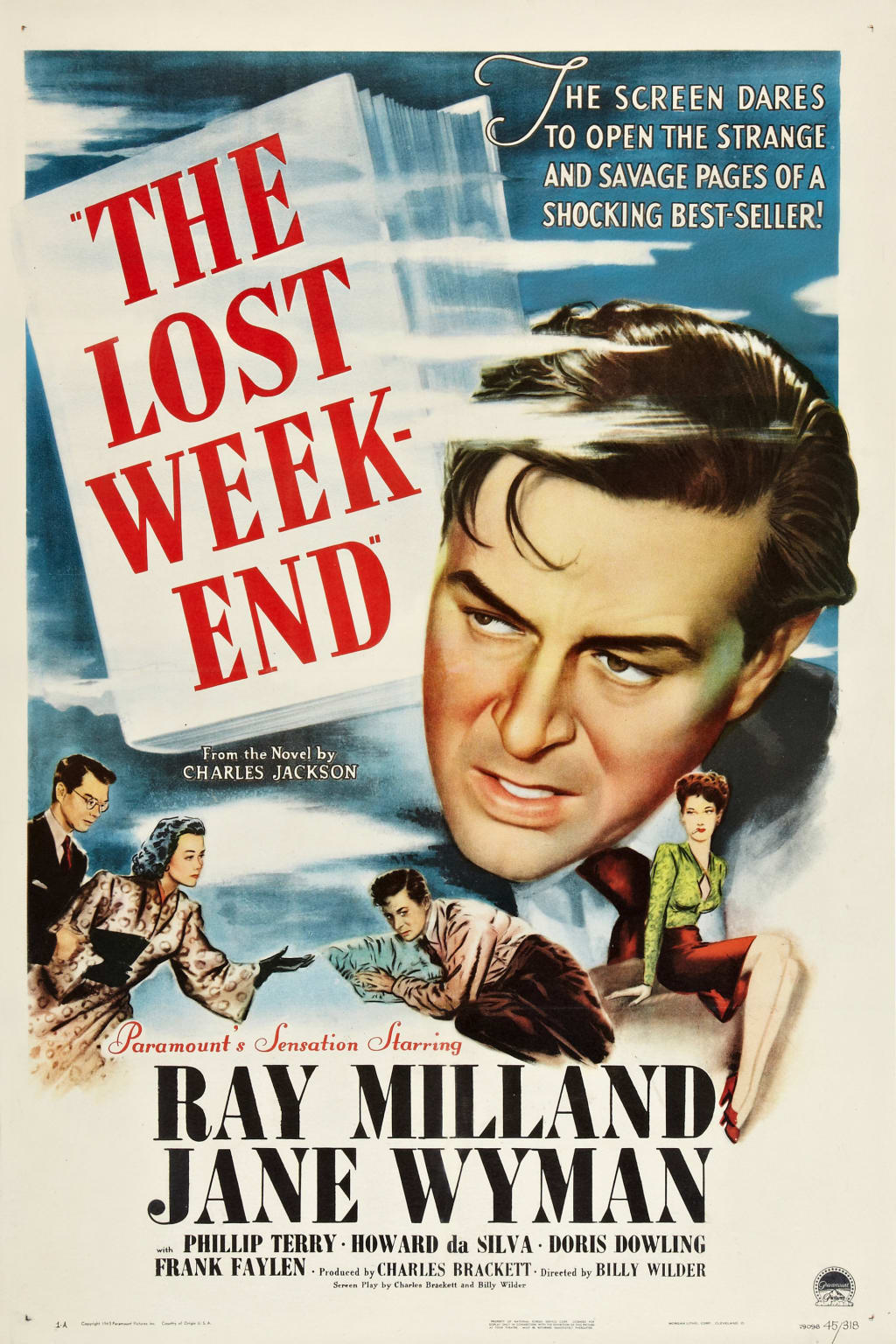
The Lost Weekend (1945)
Directed by Billy Wilder
Written by Charles Brackett, Billy Wilder
Starring Ray Milland, Jane Wyman
Release Date November 29th, 1945
Published April 2nd, 2023
Billy Wilder's 1945 film The Lost Weekend is the classic on this week's Everyone's a Critic Movie Review Podcast, available wherever you listen to Podcasts. We chose it for the theme of addiction which is also central to the new movie, A Good Person starring Florence Pugh and Morgan Freeman and directed by Zach Braff. Listen to the next Everyone's a Critic Movie Review Podcast where myself and my co-hosts, Bob and Jeff, talk about both of these movies and their unique takes on addiction.
What do we know about Don Birnam, the main protagonist of Billy Wilder's 1945 drama, The Lost Weekend? He's approximately 32 years old, the age of actor Ray Milland when he made The Lost Weekend. He's a failed writer who lives in New York City. He's been living off of the kindness of his brother Wick (Phillip Terry) since he came to New York as a much younger man. And, most importantly, according to the story playing out, Don Birnam is a borderline suicidal alcoholic.
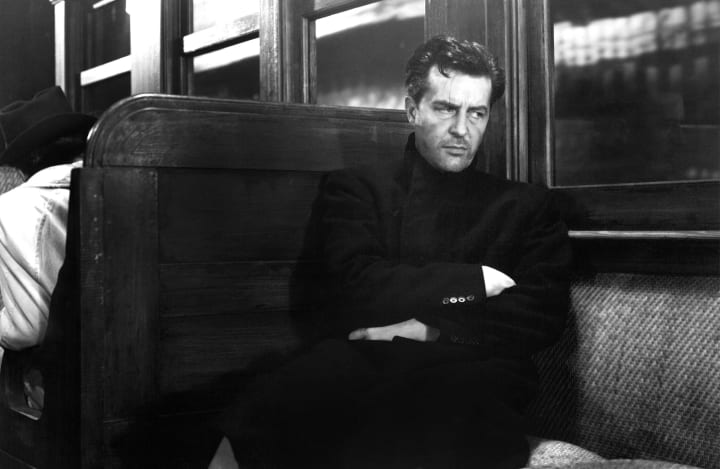
Don also has a loving and deeply devoted girlfriend in Helen St. James, played by Jane Wyman. Why she's so devoted to him is a bit of a mystery. He's not a particularly kind or charming man when we meet him. So what is it? Perhaps she sees that he has the potential to be a good man? That's about as far as I can stretch to find a good justification for the kind of devotion Helen demonstrates to Don. She risks everything to save him and he rewards her by seeking other women as a means of seeking his next drink.
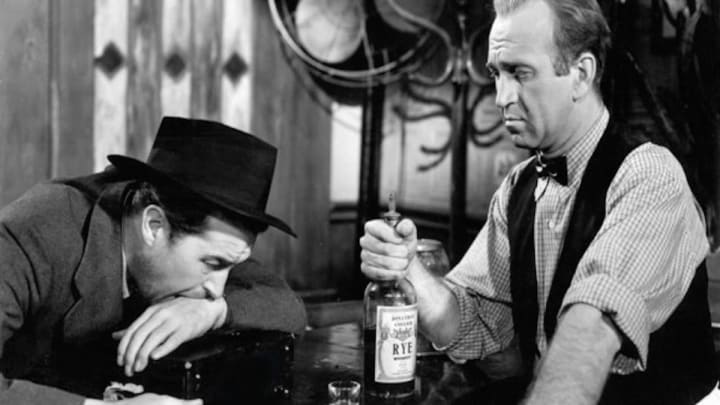
The end of The Lost Weekend comes after Don has pawned off Helen's expensive coat to recover a gun he'd pawned off before in order to buy alcohol. He's demonstrated earlier, in an exchange with Helen and Wick, that he had considered suicide and shows them the bullets to a gun he'd pawned in order to buy more booze. With the gun retrieved Don sets about his dark task only to have Helen arrive just in time. As the two struggle, Don's favorite bartender shows up to return his lost typewriter.
Seeing as fate has interceded, Don gives Helen the gun and takes up his typewriter. Throwing a cigarette into a glass of gin, rendering it undrinkable, Don sits at his typewriter inspired to write down everything that has happened to him in this lost weekend, starting with the scene that opens the movie, a bottle of booze hanging from a rope outside his apartment, a device to hide the booze from the prying eyes of the people who care about him. Thus the circle of The Lost Weekend is closed.
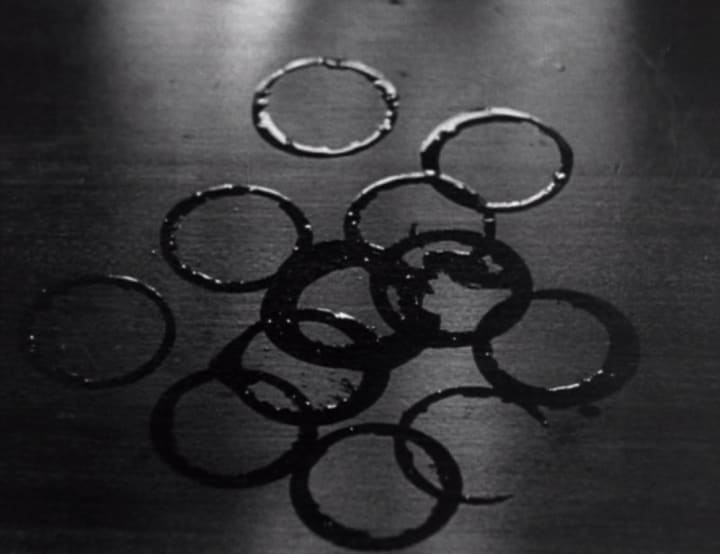
What is the nature of addiction? What causes one to become addicted to alcohol or drugs? The tools themselves, alcohol are, in part, at fault for having been created to be addicting. We've been sold a bill of goods by those that profit from alcohol that it is our fault if we get addicted to it. But the reality they want us to ignore is that their product is specifically conceived to cause addiction and line the pockets of the companies that make it.
Putting that aside however, addiction is often related to trauma, whether large or small. In order to numb the pain of a significant trauma someone may choose to drink alcohol as a temporary respite from their emotional pain. Not dealing with the trauma however, only makes it worse and the reliance on alcohol deepens as the unrepaired trauma festers into greater and greater pain. There is also a Pavlovian effect at play as alcohol numbs the emotional pain it tricks the mind. I hurt, I drink alcohol, I hurt less. A cause and effect pattern becomes reinforced in the mind of an addict.
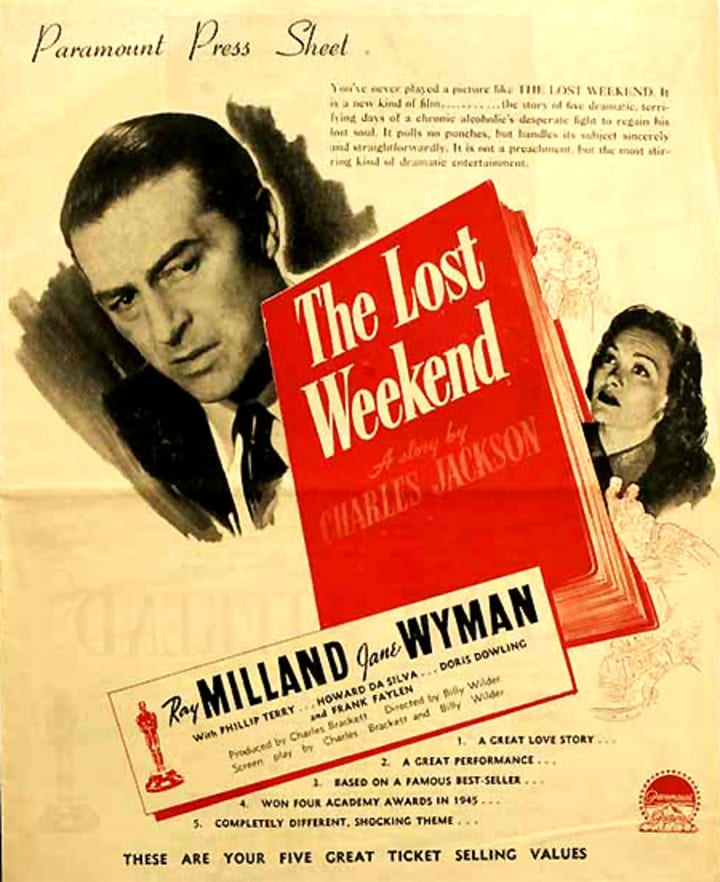
For Don, the trauma is rather minor in the grand scale of things. He's ashamed that he's failure as a writer. Drinking gives him the confidence to think that he can overcome anything, that he can be the great man he wishes to be. Thus, Don's cause and effect pattern is the pain of self-loathing, drinking alcohol, no more self-loathing. There is also shame. Don is ashamed of living off of the provenance of his brother and ashamed that he can't be the man who Helen thinks he should be. Alcohol cures those two shames as well.
Is this is a simplistic reading of addiction? Perhaps, but on a base level, it's not wrong. It is perhaps that simplicity that makes The Lost Weekend so memorable and beloved. It offers some relatively simple answers regarding the nature of drinking and addiction. We know why Don drinks and why he would benefit from not drinking and what it takes to get him to see that he needs to stop. It's a rather tidy narrative made less tidy by Don's actions while drunk as a carouser, a beggar, a thief, a man desperate to feed his addiction.
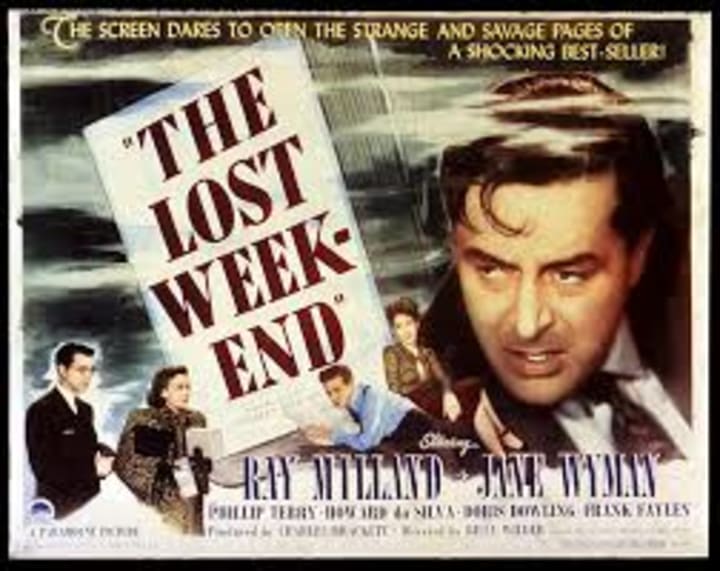
I also don't believe that Billy Wilder believes that The Lost Weekend is the last and final word on addiction. There is nothing grandiose about The Lost Weekend. It's not played like a definitive take, it's very much an intimate and personal story. It's about one man, what caused his addiction and how he will eventually begin a road to recovery. There is no one way to be addicted and no one way to overcome it. By making his story so intimate and personal, Wilder buys the ability to say that this is how Don's addiction plays out, this is his story.
There is an uglier, nastier and more mean-spirited reading of The Lost Weekend. It's one where we sneer at Don Birnam and wonder why his story deserves our attention. A mediocre man drinks himself to death in America on a daily basis, what makes Don Birnam so special? He has everything and chooses to drink anyway. He has a brother who has made his life possible, he has a loving girlfriend, and other women seem to fall at his feet like he is some kind of Chad-God. What does he have to be so traumatized about when other people have no support system, no one to love them, and get no attention whatsoever?
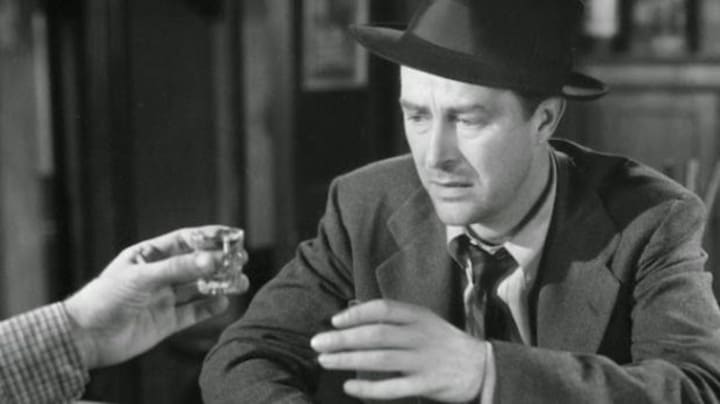
If you feel that way, I understand. But I still see value in the work of Billy Wilder and Ray Milland. I find that what Wilder accomplishes with The Lost Weekend is an act of empathy for a man perhaps not worthy of such empathy. Don squanders all of his advantages, he's a definitive fuck-up. But he's also deeply relatable to anyone who has suffered a setback and allowed that setback to consume them. It's a far more universal story than a larger, more specific trauma.
Don's shame over being a failure can be felt by anyone and has been felt by many, many people. Don's struggles aren't intended to be on the scale of the kind of horrific traumas that others have been through that drove them toward addiction. Rather, Don is a more representative trauma, the kind of base trauma that many, many more people can relate to. He's a small-scale fuck-up with a chance to recover and grow from his struggle. That's something that a lot of people can relate to. In that way, there is a value to The Lost Weekend. It shows what happens when you allow shame and setbacks to fester.
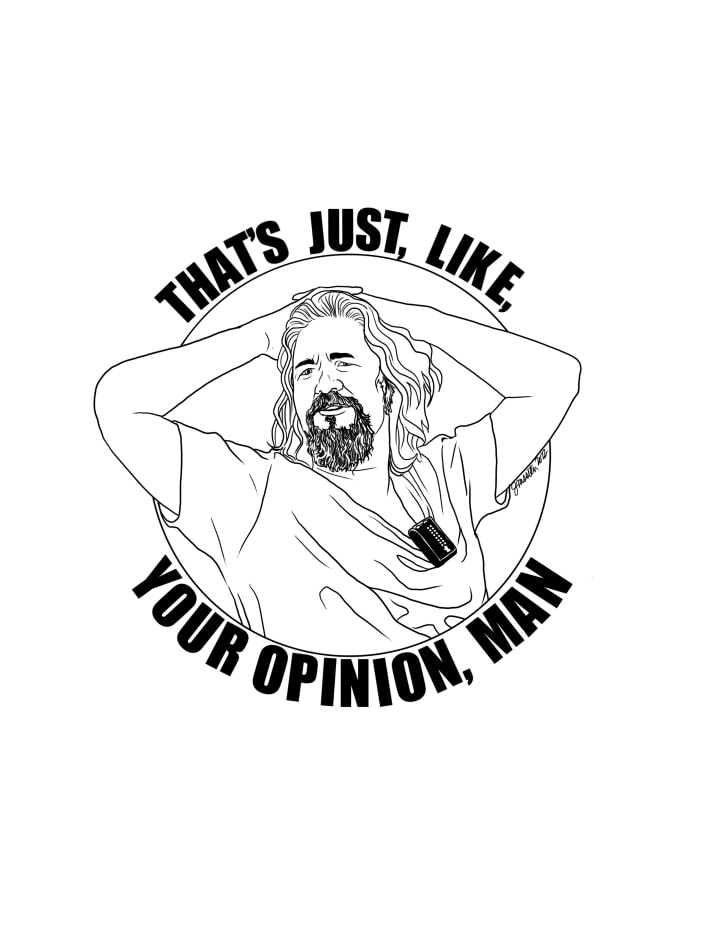
It's a call to understand that a failure doesn't have to define you and that allowing other people to care about you and take care of you, pick you up when you fall, is not something to be ashamed of. Wick and Helen might be called simps but the reality is, they simply love a man and don't want to see him die. If that makes them simps then sign me up. I want to be there for the people I love. I want to lift them up when they are down. I want to punch through the hard times and see the potential for good. Whether you feel Don or people like him deserve such devotion is very much a personal preference.
Find my archive of more than 20 years and nearly 2000 movie reviews at SeanattheMovies.blogspot.com. Find my Modern review archive on my Vocal Profile, linked here. Follow me on Twitter at PodcastSean. Follow the archive blog at SeanattheMovies. Listen to me talk about movies on the Everyone's a Critic Movie Review Podcast. If you have enjoyed what you have read, consider subscribing to my work on Vocal. If you'd like to support my writing you can do so by making a monthly pledge or by leaving a one-time tip. Thanks!
About the Creator
Sean Patrick
Hello, my name is Sean Patrick He/Him, and I am a film critic and podcast host for the I Hate Critics Movie Review Podcast I am a voting member of the Critics Choice Association, the group behind the annual Critics Choice Awards.






Comments (2)
Nice
Great review :) Additionally, I would appreciate it if you could check out my stories, as I am a beginner and would welcome any suggestions about them.